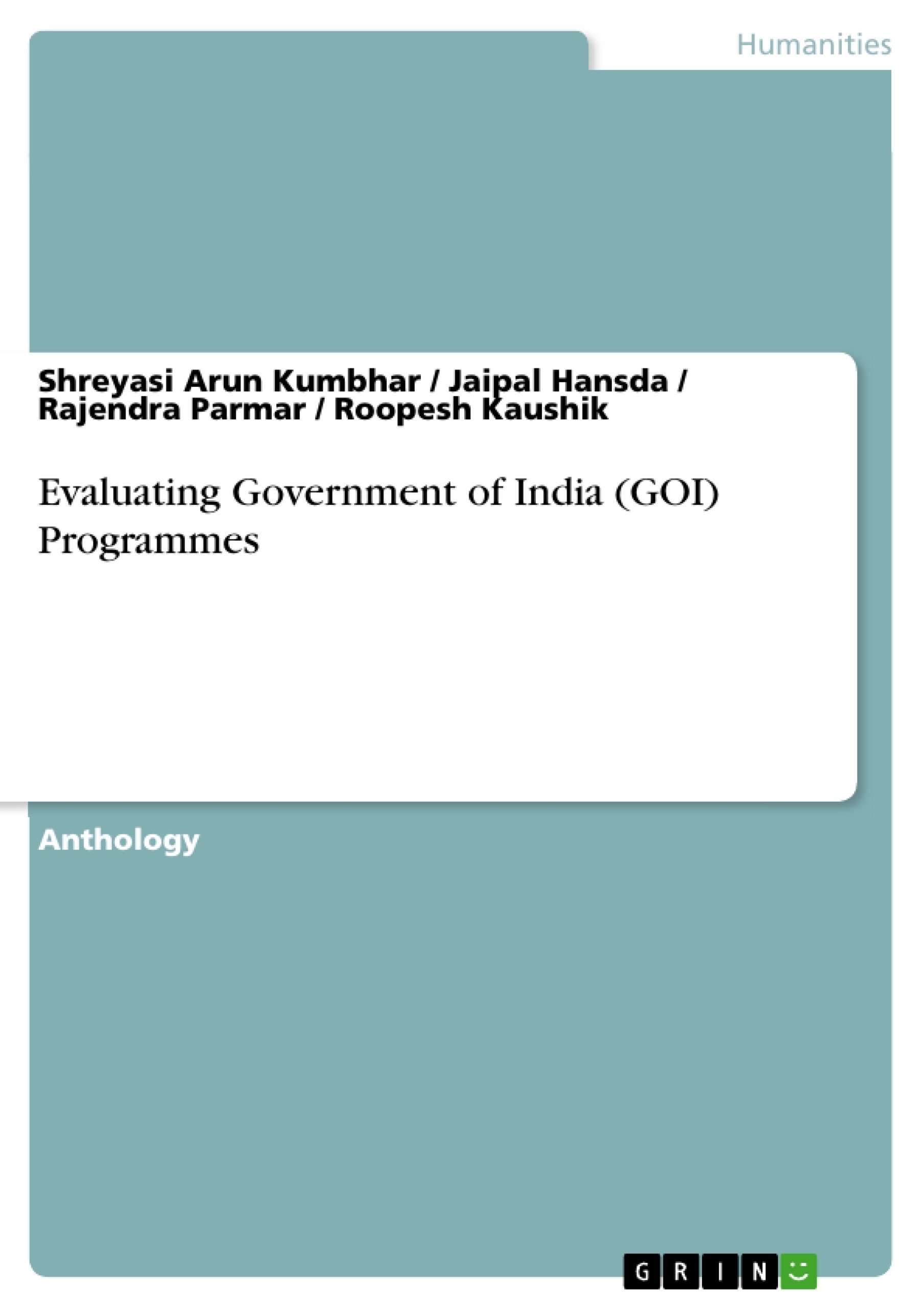The objective of this book is to study various Government of India (GOI) Schemes and to examine the ground realities with regard to the implementation of Government of India Schemes, in the area of the study. This book is a collection of three case studies: (i) Issues and Challenges in Government of India Food Security Programmes (ii) Role of Mahatma Gandhi National Rural Employment Grantee Act (MGNREGA) in Rural Development (iii) Impact Assessment of Integrated Watershed Management Program: A case study of Barlai village of Neemach district in Madhya Pradesh which had been conducted to evaluate the Government of India (GOI) Scheme in the area of the study.
Inhaltsverzeichnis (Table of Contents)
- PART I
- ISSUES AND CHALLENGES IN GOVERNMENT OF INDIA FOOD SECURITY PROGRAMMES
- Introduction
- Review Of Literature
- Theoretical/Conceptual/Operational Framework
- Methodology (Research Design)
- Results And Discussions
- Conclusion And Recommendations
- Role of Mahatma Gandhi National Rural Employment Grantee Act (MGNREGA) in Rural Development: A Study of Chaibasa & Jhikpani Blocks in West Singhbhum district of Jharkhand
- INTRODUCTION
- Results & Discussion
- Comparative Study Of Chaibasa Block And Jhikpani
- Summary And Conclusion
Zielsetzung und Themenschwerpunkte (Objectives and Key Themes)
This book aims to analyze the effectiveness of various Government of India (GOI) schemes by examining their implementation on the ground. The research delves into the challenges and opportunities associated with these programs, using case studies to provide a nuanced understanding of their impact on socio-economic development.- Evaluation of Government of India (GOI) schemes in rural areas
- Impact assessment of socio-economic development initiatives
- Challenges and opportunities in implementing government programs
- Role of community participation and stakeholder engagement
- Analysis of the effectiveness of various government programs in addressing poverty and food security
Zusammenfassung der Kapitel (Chapter Summaries)
- PART I: ISSUES AND CHALLENGES IN GOVERNMENT OF INDIA FOOD SECURITY PROGRAMMES
- Introduction: This chapter provides an overview of the study, outlining the problem statement, objectives, hypothesis, and significance of the research. It also introduces the context of food security in India and the role of government programs in addressing this issue.
- Review Of Literature: This chapter examines existing literature on food security, government programs, and their impact on rural communities. It highlights key theories, concepts, and research findings relevant to the study.
- Theoretical/Conceptual/Operational Framework: This chapter presents the conceptual framework guiding the study. It defines key concepts, variables, and the theoretical underpinnings of the research.
- Methodology (Research Design): This chapter details the research methodology, including data sources, data collection methods, and data analysis techniques. It explains the rationale behind the chosen research design.
- Results And Discussions: This chapter presents the findings of the study, analyzing the data collected and drawing conclusions about the effectiveness of the government programs. It also includes case studies and focus group discussions to provide a deeper understanding of the issues.
- PART II: Role of Mahatma Gandhi National Rural Employment Grantee Act (MGNREGA) in Rural Development: A Study of Chaibasa & Jhikpani Blocks in West Singhbhum district of Jharkhand
- INTRODUCTION: This chapter provides an overview of the MGNREGA program, its objectives, and its role in rural development. It also introduces the context of the study area and the specific challenges faced by rural communities in the region.
- Results & Discussion: This chapter presents the findings of the study, analyzing the impact of the MGNREGA program on rural development in the study area. It explores the program's effectiveness in creating employment opportunities, improving livelihoods, and contributing to overall development.
- Comparative Study Of Chaibasa Block And Jhikpani: This chapter compares the implementation and effectiveness of the MGNREGA program in two different blocks within the study area. It examines the factors contributing to variations in the program's impact and identifies best practices.
Schlüsselwörter (Keywords)
This book explores the critical themes of government programs, socio-economic impact assessment, rural development, food security, and poverty alleviation. The research focuses on the effectiveness of various government schemes, including the National Rural Employment Guarantee Act (MGNREGA), and their impact on rural communities in India. Key concepts explored include community participation, stakeholder engagement, and the challenges and opportunities associated with implementing government programs in a developing context.Frequently Asked Questions
What is the main goal of this book on GOI programmes?
The goal is to evaluate the effectiveness and ground realities of Government of India (GOI) schemes through specific case studies in rural areas.
Which specific government schemes are evaluated?
The book focuses on Food Security Programmes, the Mahatma Gandhi National Rural Employment Guarantee Act (MGNREGA), and the Integrated Watershed Management Program.
What were the findings regarding MGNREGA in Jharkhand?
The study examined the program's role in rural development in the West Singhbhum district, comparing its implementation across different blocks to identify best practices and challenges.
What are the common challenges in implementing food security programs?
Key challenges include operational hurdles, issues in reaching the target population, and the need for better stakeholder engagement to ensure food reaches those in need.
Why is community participation emphasized in the research?
Community participation is seen as a vital factor for the success of development initiatives like watershed management and employment schemes to ensure long-term sustainability.
What regions were covered in the case studies?
The research includes studies from Madhya Pradesh (Neemach district) and Jharkhand (West Singhbhum district).
- Arbeit zitieren
- Shreyasi Arun Kumbhar (Mit Beiträgen von), Jaipal Hansda (Mit Beiträgen von), Rajendra Parmar (Mit Beiträgen von), Roopesh Kaushik (Herausgeber:in), 2016, Evaluating Government of India (GOI) Programmes, München, GRIN Verlag, https://www.grin.com/document/324155



